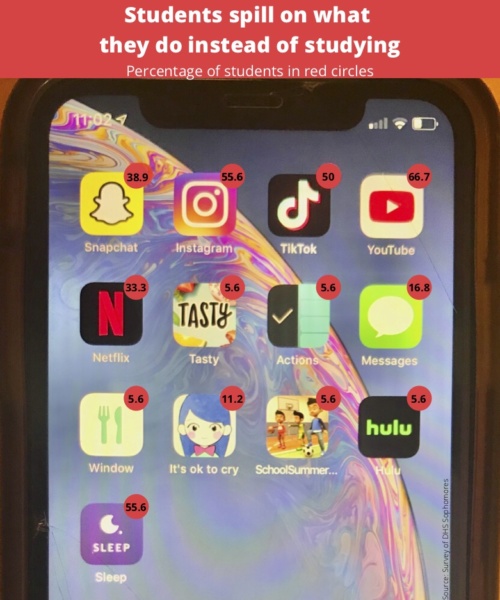“I can sleep when I’m dead”: procrastination sweeps the nation
PHOTO: Sophomore Jeesoo Jung procrastinates on her English essay by scrolling through Instagram (Picture illustration).
By Jihan Moon,
BlueDevilHUB.com Staff–
Dozens of ramen cups perch atop of wooden cupboards, peering down on sophomore May Wang scribbling down solutions to her outstanding calculus homework. Shawn Mendes blaring through her earbuds, Wang hums along to, “I could feel the tension, we could cut it with a knife.” She tosses aside a few lollipop wrappers and drags the party size Cheetos bag back in reach.
It is 2 a.m. and she isn’t even close to finishing.
Wang endures many nights awake until 4 a.m. “[I] tell myself I can sleep when I’m dead,” Wang said.
Students throughout Davis High and the nation have been affected by the same epidemic Wang has: procrastination. According to StudyMode’s “Student Psyche Report,” 87 percent of high school and college students in the U.S. procrastinate.
“I procrastinate on just about everything, from homework to sending emails and doing chores,” junior Alex Boettner said.
The weekend prior to when her ninth grade final project was due, Boettner grinded “from the moment [she] woke up to the moment [she] went to bed” on her project. “I still ended up staying up until 5 in the morning on Sunday,” Boettner said. Her teacher had assigned the elaborate, multipart scrapbook one and a half months before the end of the semester.
“I would have definitely tried managing my time better if I could […] do it all over again,” Boettner said. However, she felt contented with her final product.
Limited time on an assignment induces anxiety in Boettner and she deals with the problem by setting aside homework, and therefore stress, until absolutely necessary.
According to Uta Russell, a local therapist specializing in adolescents, there are three types of procrastinators: avoiders, thrill seekers and decisional procrastinators.
Thrill seekers do just that; they seek the thrill of accomplishing a task quickly and hurriedly.
The fear of either success or failure drives avoiders to not complete their assignments in a reasonable time. This way, they have an out if they don’t receive a desirable grade; they tell themselves it wasn’t their best effort.
How do I even start this? I don’t even have time to start, what can I do? Decisional procrastinators struggle with these questions, leading to their ultimately stressful night.
Veronica Uy, a sophomore, was awake until 4 a.m. last school year wrapping up her quarter-long biology project. Prior to that evening, all she accomplished was one page of her lab report. She completed the lab report, crafted a model and produced a poster that night.
She earned an A.
Uy recognizes she works better under pressure. However, Russell considers that to be a false belief.
Russell defines a false belief as a belief someone tells themself that relies on incorrect assumptions or a lack of logic; it’s a common thinking error.
Sophomore Silke Pion is one of the few examples of a student who rarely procrastinates, although she used to.
In elementary school, Pion procrastinated on any and every project, until she resolved to stop procrastinating. “Break [your] projects into bite-sized pieces,” Pion’s mother would teach her. That is also a strategy utilized by Russell with her patients.
“Now I have time to make something I’m proud of,” Pion said.




